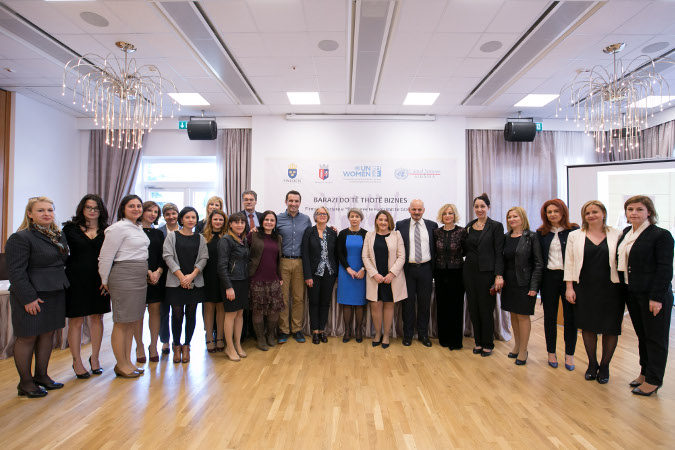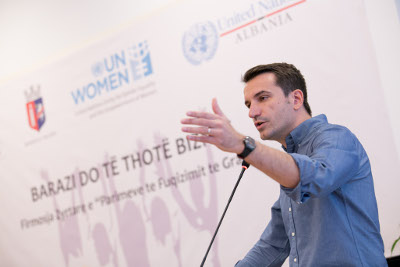Albanian companies sign Women's Empowerment Principles to advance gender equality in business
For the first time in Albania, 11 private sector companies have signed on to the Women’s Empowerment Principles to bring gender equality into the workplace. The Principles are part of a UN Women partnership with the UN Global Compact.Date:

Representatives of 11 private companies that signed WEPs. Photo: Municipality of Tirana
CEO’s of 11 private sector companies in Tirana, Albania signed a declaration of commitment – known as the Women’s Empowerment Principles -- to support the advancement of gender equality. The businesses that voluntarily agreed to bring the Principles into their work practices included construction, banking, IT and telecommunications.
The Women’s Empowerment Principles are part of a UN Women partnership with the UN Global Compact and represent aims that have been approved by and reflect the interests of the Albanian Government and civil society. The Women’s Empowerment Principles, in brief, are:
- Principle 1: Establish high-level corporate leadership for gender equality
- Principle 2: Treat all women and men fairly at work - respect and support human rights and non-discrimination
- Principle 3: Ensure the health, safety and well-being of all women and men workers
- Principle 4: Promote education, training and professional development for women
- Principle 5: Implement enterprise development, supply chain and marketing practices that empower women
- Principle 6: Promote equality through community initiatives and advocacy
- Principle 7: Measure and publicly report on progress to achieve gender equality

The Mayor of Tirana, Erion Veliaj, said: “Our challenge is to create successful models, starting with these 11 businesses, the first ones to sign the Women’s Empowerment Principles in Albania. By turning their examples into success stories, these companies can empower Albanian women far more than any study or strategy can.”
UN Women Representative in Albania, Mr. David Saunders said, “With these seven principles, profit making companies can confront stubborn issues of inequality and promote creative solutions, inclusion and systematic change.”
The Albanian companies will take concrete actions to promote gender equality. Their pledges include zero tolerance policies towards discrimination and violence against women in the workplace, training for their employees and women entrepreneurs, and the use of indicators to measure the professional development of women staff.
Albpastrim, a professional cleaning company, will focus on the Principles regarding equal remuneration and staff training. CEO, Ms. Valbona Begolli says that by empowering women, the whole of society is empowered. “It is an investment for the future and guarantees prosperity,” she adds.
Through technical support to Tirana Municipality, UN Women provided training on the Principles, and how to measure progress in “gender objectives” for dozens of private companies in Tirana. In 2017, a national index will be set up to track how companies adopt these principles in their policies.
Daniela Leskaj, Deputy President of Matrix, says, “Signing the WEPs will improve company policies, internal communications, and performance, as well as increase trust with partners and clients.”
This first-time initiative in Albania received financial support from the Swedish International Development Cooperation Agency (SIDA). Since 2010, more than 1,000 business leaders from across the world have signed their support for the Women’s Empowerment Principles. UN Women in Albania plans to expand the effort across the country.